AFTER THE BELL
Could Kayamandi lead the continent in fibre connectivity roll-out?

OK, this is tricky. This week, the website MyBroadband reported on a new project by former iBurst and Mxit CEO Alan Knott-Craig (junior) to provide cheap, uncapped fibre to SA townships.
I have to say, I’m completely taken with the idea; I think it’s fantastic. The tricky part is not that project, but the fact that Knott-Craig is a shareholder in Daily Maverick. So, obviously, cards on the table, a degree of perspective is required here.
The project — no matter the shareholder — is a cracker and really could help smash the digital divide wide open. Now, if one is being honest, a certain amount of scepticism is appropriate here; Knott-Craig’s history with Mxit was, well, mixed. Mxit got lots of support from some very well-known backers of internet startups, but it ended in tears.
But perhaps the Mxit disaster is actually one of those very strange positives/negatives that often occur in the tech startup world. I’ve written about this before: one of the leading indicators of a successful startup is that the key personnel have been part of a different startup, which may or may not have ended up on the trash heap.
What’s different?
So, what makes this idea different? The more you hear about it, the more positive it sounds. What Isizwe, the company involved, has done is launch an uncapped fibre-to-home project in the Kayamandi township outside Stellenbosch, which will cost residents R5 a day and runs at 100Mbps.
That sounds nuts. But, you know, wonderfully nuts. The idea that township residents will be getting faster internet than most suburban homes for about one-fifth of the price just tickles me pink.
Can this possibly make money or are we headed for Mxit II? I do know Knott-Craig a little, so I called him and he sounded, as always, fabulously convincing.
The holy trinity for providing cheap bandwidth to the home, he says, includes, first, providing fibre, not via trenches but overhead, strung up on telephone poles, of which there are gazillions in townships. Second, offering more homes connections for the same infrastructure-per-connection cost as you would a single suburban home because of the lower spatial distance between township houses. And, third, billing pay-as-you-go based on usage time, not on the quantity of data. Boom.
And then there is another thing: the way the telecoms business has unfolded in South Africa, and the world for that matter, is something Knott-Craig knows about because of 1) dad and 2) being in the industry himself for so long.
When cellphones were initially launched in South Africa in 1994, it was assumed that they would have 50,000 customers in five years, so profitability was pegged at a rate that would make the cellphone companies profitable at this level. In fact, they hit that target in six months. That naturally made the initial cell companies very profitable, which they have been — give or take a few newcomers — to this day. Oddly, though, they never decreased their rates to match the new reality. Strange that. But you know, shareholders, and, let’s face it, greed, licence to print money, etc.
Billing
The point is that internet provision can happen at a much cheaper rate than it is at the moment, and Isizwe is going to try to prove it. But what is so impressive about the roll-out is how well it has been handled and how logically the system has been implemented. For one thing, time-based, rather than quantity-based, billing is much more understandable. I swear I have no idea how my Vodacom bill works. I just know it costs a huge amount. I pay more for cellphone usage than I do for beer: that is just criminal.
But just to add a layer of functionality and modernity, billing happens on a specially created stablecoin called VulaCoin, which obviates the need for users to have credit cards and specific bank accounts, saving them all kinds of, well, extortionate bank charges.
There are two little caveats here: the first is that connections are per device, not per home. There is a router, but it’s linked to particular devices in the house and each is charged separately. The second is that the connection is, by definition, static. But if you have paid your charge for the day, you can connect to any access point in the township. However, once you are out of the township, you sadly return to reliance on that irritatingly expensive cellphone network.
Visit Daily Maverick’s home page for more news, analysis and investigations
But the upsides, if Knott-Craig and his team can make it work, are just gobsmacking. Only 3,000 homes are connected in Kayamandi at the moment. But there are 180 million township homes across the continent and a potential of one billion customers. The prospective addressable market is huge, and because it is, a whole range of very recognisable names are involved in this little effort, including Liquid Intelligent Technologies, EasyEquities, Nokia, Asla, Cambium Networks, and Hexatronic.
If this market can be reached, think about how it could transform the lives of township dwellers; providing world-class education at the touch of the button, feeding hours of entertainment, escalating entrepreneurship and pouring information by the gallon through those fibres. It really takes the digital divide and not only builds the bridge, but leapfrogs the gulf.
So how is it working? Roll-out began a few months ago and so far, like a bomb. Knott-Craig says their target take-up rate to hit profitability would be 60% of the available devices linked to a router, which they install free. That would make the company as profitable as a traditional fibre network in a leafy suburb like Parkview. At the moment, they are getting a 240% take-up rate. The network effect — literally in this case — is at work, because friends tell friends, inclusion extrapolates, novelty turns to reliance.
The money
Knott-Craig says nobody provides fibre to the township because they think there is no money there. But this is not true; people do have money, there are fridges and TVs and bars and shops. They just don’t have a lot of extra money. Huge organisations like PEP and Capitec have created enormous businesses appealing to township dwellers by understanding intimately what they need most: good quality, provided cheaply.
Will this work? Who knows, but I really, really hope so. The big advantage with fibre is that it doesn’t involve bandwidth auctions which would put you head-to-head with the mega cell organisations. In a sea of bad news this year, this is really a bright spot on the ocean. BM/DM





















 Become an Insider
Become an Insider
Fantastic initiative!